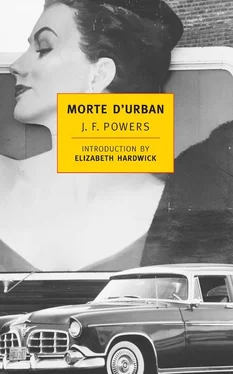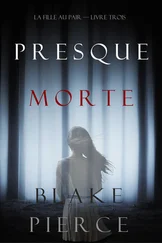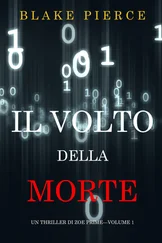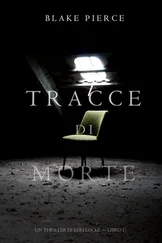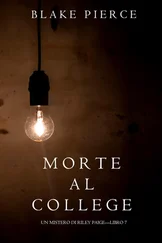Father Excelsior had come prepared, if need be, to speak on the subject of editor and publisher, which subject (like those of writer and reader, writer and publisher, publisher and reader, reader and editor, writer and editor, and bookseller and all of these, in all possible combinations) was one he’d always done justice to at conventions and book fairs, but there was no need to hear any more from Father Excelsior that morning. With no more ado, the marriage arranged by him and Father Urban, the marriage between the Millstone Press and Eight Seasons Editions (though not in precisely those terms), was voted, Father Boniface said, “Permission granted,” and the meeting ended, as it had begun, with a prayer.
After that, many men, among them some who’d once been indifferent and even hostile, came up to Father Urban. They congratulated him, wished him well, pressed his hand, or just stood and gaped at him. Presently, when the room had cleared, Father Urban and his faction (and Father Siegfried) went off for a cup of coffee — swept off like Robin Hood and his merry men.
That night Father Urban departed from Union Station on the Western Star.
In the afternoon, before leaving the Novitiate, he had visited with his old confessor Father August. In the evening, he had dined with Billy and Father Louis in the Pump Room. Lobster and champagne, and Billy reaching the stage where he asked waiters why there were more horse’s asses—“horshes’s ashes”—in the world than horses, an old question with Billy, and Father Louis getting off on his favorite topic. Hard as it was for a superior man to keep from going sour in the Order of St Clement — no one knew this better than Father Urban — Father Louis might have handled himself better than he had in the Pump Room. “Clementines, Dalmatians, Dolomites — all third raters,” he’d informed Billy. Father Urban had hotly denied this, where the Clementines were concerned, citing Father Excelsior and one or two others. To this, with a great show of judiciousness, Father Louis had replied, “We have very few second-rate men.” Here Billy had laughed, and perhaps he hadn’t been scandalized (always the danger with laymen), and perhaps he’d believed Father Urban when he said that Father Louis was only joking, but it was still one hell of a thing to tell a benefactor. Wasn’t it odd, though? Father Urban, thinking it would be well for the Order if somebody on the spot kept in touch with Billy, had considered Father Louis the best available man for the job and had brought him along to dinner. Billy and Father Louis were compatible, but in a negative sort of way, and Father Urban rather hoped they wouldn’t be seeing too much of each other in his absence.
When Father Urban arrived back at St Monica’s, as he did about 3:30 P.M. the next day, he saw Monsignor Renton’s black car parked in front of the rectory and hurried inside. Monsignor Renton wasn’t there, though. (“He must be in the church,” said Mrs Burns.) When Monsignor Renton entered the rectory, Father Urban was on the phone. “That was the Chancery,” he said, after hanging up. “I suppose you’ve heard the bad news.” Father Udovic, come Monday, would be pastor of St Monica’s.
Monsignor Renton sighed and said, “It may not be permanent.”
“Let’s hope not,” said Father Urban. Until a moment ago, until he’d asked who the new chancellor of the diocese would be, he’d had no particular reason to dislike Father Udovic. “Nobody,” Father Udovic had replied, “I’ll have two jobs. It shouldn’t be so hard.” Father Urban, feeling that the importance of the job that had been his in everything but name for so many weeks was being grossly underestimated, had let the man know what might be regarded as the lesser of his two labors: “No, I suppose not — not in a diocese like this.”
“Rather see it go to Cox or Box,” said Monsignor Renton, which showed how he felt about the appointment — and perhaps that he did regard it as permanent. “I thought the idea was for you to stay on here until ordinations in June, but something must have happened to that. You didn’t ask to be relieved, did you?”
“No,” said Father Urban, feeling, though, that he was responsible for Father Udovic’s appointment, and would be so judged if Monsignor Renton ever found out about the interview with the Bishop.
“Dear James should have his head examined,” said Monsignor Renton.
“By the way, how’d you make out?” Father Urban asked. He was asking about the third horse in his three-horse parlay, Billy and Father Boniface being the first two, and both winners. It had been left to Monsignor Renton to approach the Bishop (whose approval was required for any expansion) in the matter of the golf course.
“It’s all set,” said Monsignor Renton.
Father Urban phoned Wilf and told him that all was well, and then he said to Monsignor Renton: “How about a drink, Red?”
Monsignor Renton was in a melancholy mood. “No,” he said.
“Don’t take it so hard, Red. How about a cigar?”
Monsignor Renton felt better after lighting up a Dunhill Monte Cristo Colorado Maduro No. 1—Father Urban had replenished his supply in Chicago. They fell to discussing the course, and got so worked up about it that they just had to have a look at the site. They jumped into the Imperial, Father Urban taking the wheel and racing against darkness. Mr Hanson and Rex were home, and the thin little woods looked the same to Father Urban, but it did seem to him that Mr Hanson and Rex were less friendly than before. “Is something wrong?” Father Urban asked.
“Yar,” said Mr Hanson. He said he wanted a few days to think over the deal. “I better talk to the other fellers.”
“Now wait a minute,” said Father Urban. After a bit, after exercising great patience, he got at the trouble. It wasn’t greed. No, while Father Urban was away in Chicago, Wilf had visited Mr Hanson. Citing the condition of the house and the barn, Wilf had asked Mr Hanson, in effect, to show cause why he shouldn’t throw in the dog.
“Then you’re taking Rex to California?” said Father Urban, noticing that Rex was following the conversation closely.
Mr Hanson shook his head.
“You’re not? Did you tell Father Wilfrid that?”
“I didn’t tell him nothing. I got to get my price.” Mr Hanson seemed to think that Wilf, by harping on the condition of the barn and house, had been trying to beat down the price.
“ Will you throw in the dog?”
“Yar.”
“It’s a deal,” said Father Urban. He asked Mr Hanson to meet him at a bank in Great Plains the next morning, and wrote down the name of the bank. “Rex’ll have a good home, Mr Hanson.”
“Yar, O.K.”
That evening Father Urban paid a call on one of the bank’s vice presidents, on the George whose virus he’d asked about earlier in the week. Father Urban had a check from Billy — a check for enough to purchase the land, to pay for building and furnishing the course, and more (“While you’re at it, why don’t you buy yourself a decent rowboat?”), but it was a personal check, made out to Father Urban, and that was where George came in. Father Urban and George worked it all out, while Marge, George’s wife, served them coffee. George’s bank would stand back of the sum to go to Mr Hanson until Billy’s check cleared, and thereafter St Clement’s Hill would do business with George’s bank. This was a big step up. Until then, there having being nothing much to put in a bank, Wilf had run the whole operation out of his shoe, paying bills by postal money order.
The next morning Father Urban and Mr Hanson met at the bank. Mr Hanson, after signing the necessary documents, was given a certified check, and thus he got his price, and his land and dog became the property of the Order of St Clement. Father Urban called up Wilf to tell him the good news.
Читать дальше
